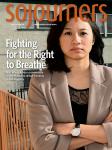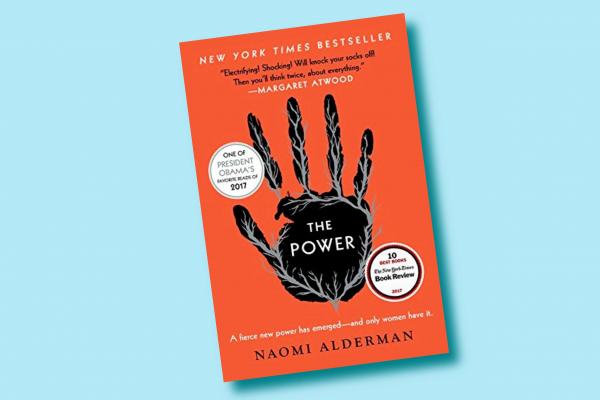THE POWER IS THE fourth novel by Naomi Alderman, protégé of award-winning author Margaret Atwood (The Handmaid’s Tale). It centers on the discovery among the world’s women that they have a unique muscle, called a “skein,” embedded into their skin that when activated gives them an electric power that they can use to both hurt and heal.
The story is told through the narration of four protagonists—Tunde, Allie, Margot, and Roxy. Tunde is a journalist who provides the reader a global perspective on overturned social orders and flipped cultural norms through his travels. Allie gives us a glimpse into the religious order forming around women and lightning. Margot is the mayor of an undisclosed U.S. city and walks the reader through the governmental and political consequences of the power. Roxy’s involvement in organized crime affords the perspective of people leveraging a new social order for financial gain.
Alderman explores in depth the role reversals between men and women. Gender-based power structures and assumptions of the previous order do not last as more women discover the power within themselves. Alderman creates a world in which men are seen as less-than, echoing stereotypes that burden women in our world: “Men are dangerous ... Men are less intelligent, less diligent, less hard-working ... Men are more likely to suffer from diseases and they are a drain on the resources of the country.”
Does this novel depict a dystopia or a feminist utopia? Critics have often called it a dystopia. Yet there are women in the world today who live under the same restraints placed on men in The Power, in which men lose the ability to drive cars, own businesses, gather together without a woman present, vote, or travel without permission from a female guardian. We are so used to the inequalities faced by women that they are just the norm, but when these same inequalities are imposed on men, suddenly the universe is broken. If The Power is a dystopia for men, our world is a dystopia for many women.
The novel also highlights an age-old question of human nature—are we truly pure and good beings or, when given a choice to be merciful and kind, do we still revert to evil? Men and women alike struggle with what power ultimately means. Violations continue to occur as half of the population comes to grips with an end to centuries of dominance, and the other half tries to balance the potential for revenge with the need for peace and stability.
Having been given physical dominance, many of the women in this book lapse into the same practices and barbaric sexual mistreatment that men formerly perpetrated. Female acquaintances steal Tunde’s writings and pictures; when asked why they would do such a thing, he says simply “because they could.” Toward the end of the novel, the camp where Roxy and Tunde take refuge is attacked by a group of rogue women. They pillage the camp and rape many of the men: “They know no one cares what happens here ... they do it because they can.” Power can corrupt, and different women in the novel, after suffering for generations, use their newfound power both to redeem themselves and to create an atmosphere in which they will never lose dominance again.
Alderman’s novel is gripping as it counts down to an event that will later be named the Cataclysm. I was flipping from page to page long after my bedtime. She has created a work that is amusing, striking, dramatic, and feasible. This novel may well serve as a next rallying point of the feminist movement, as it skillfully explores gender dynamics and ultimately lays the patriarchy to rest under a mountain of upended political roles and discarded stereotypes and social constructs

Got something to say about what you're reading? We value your feedback!

